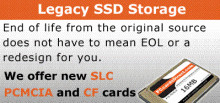Elevate Your Data Security with NIAP-Certified SSDs and CSfC/CC Products
Ensuring Top-Tier Data Protection for Airlines, Defense, and Government Departments
Data security is paramount, especially for industries where sensitive information is a critical asset. Airlines, defense companies, and government departments need robust, certified solutions to safeguard their data. We are thrilled to introduce our comprehensive set of NIAP-certified SSDs and CSfC/CC products designed to meet the highest security standards and ensure your data remains protected at all times.
Why Choose NIAP-Certified SSDs and CSfC/CC Products?
Unmatched Security Certification
Our SSDs are certified by the National Information Assurance Partnership (NIAP), which ensures that they meet stringent security requirements for protecting classified and sensitive information. This certification is essential for compliance with federal and defense regulations.
- NIAP Certification: Ensures that our products meet high standards for security features and are rigorously tested against potential vulnerabilities.
Comprehensive Solutions for Multi-Layered Security
Our Commercial Solutions for Classified (CSfC) and Common Criteria (CC) certified products provide multi-layered security solutions. These certifications verify that our products can be trusted to protect sensitive data in mission-critical environments.
- CSfC/CC Certification: Demonstrates compliance with international security standards, providing assurance that the products are suitable for high-security environments.
Key Benefits of Our Certified Products
Advanced Encryption and Data Protection
Our NIAP-certified SSDs come equipped with advanced encryption technologies that ensure data at rest is secure. This includes AES-256 encryption and hardware-based encryption mechanisms that safeguard data from unauthorized access.
- Encryption Standards: Adheres to the highest encryption standards to protect data integrity and confidentiality.
High Performance and Reliability
Our SSDs are designed not only for security but also for high performance and reliability. With rapid data access speeds and robust construction, they are ideal for demanding applications in aviation, defense, and government operations.
- Performance Metrics: Provides fast read/write speeds and superior reliability, ensuring that your operations run smoothly without data bottlenecks.
Enhanced Data Integrity and Resilience
Built to withstand harsh environments and rigorous use, our SSDs ensure data integrity even under extreme conditions. This makes them suitable for use in a variety of challenging operational environments.
- Durability: Offers high resistance to physical shocks, temperature variations, and other environmental stresses.
Simplified Compliance
By using NIAP-certified and CSfC/CC products, organizations can simplify compliance with various regulatory requirements, including those mandated by the Department of Defense and other government agencies.
- Regulatory Compliance: Helps meet regulatory standards and reduces the complexity of adhering to strict security guidelines.
Applications for Airlines, Defense, and Government
Secure Communication for Defense Operations
Our SSDs are integral to secure communication systems, ensuring that sensitive data in military operations is protected against interception and tampering. They support critical applications that require high levels of data security and integrity.
- Military Grade Security: Provides the necessary security infrastructure for defense applications, from ground operations to aerospace.
Data Protection for Government Departments
Government agencies can rely on our certified SSDs to secure sensitive information, ensuring that citizen data and classified information remain protected against cyber threats.
- Government Use Cases: Suitable for a wide range of applications, including secure data storage, encrypted communications, and protected information systems.
Reliable Storage for Airlines
Airlines require reliable and secure data storage solutions for passenger information, flight data, and operational records. Our SSDs provide the necessary security and performance to handle these critical tasks efficiently.
- Aviation Security: Ensures compliance with aviation security standards and protects against data breaches that could compromise operations.
Why Partner with Us?
Our commitment to security, performance, and reliability makes us the ideal partner for your data protection needs. We offer:
- Expertise: Deep knowledge and experience in providing secure data storage solutions.
- Support: Comprehensive customer support to assist with implementation and ongoing maintenance.
- Innovation: Continuous innovation to stay ahead of emerging security threats and technological advancements.
In an era where data security is more critical than ever, our NIAP-certified SSDs and CSfC/CC products offer the highest level of protection for your sensitive information. Whether you are in the airline industry, defense sector, or a government department, our products provide the robust security, performance, and reliability you need.
Contact us today to learn more about our secure data storage solutions and how we can help protect your valuable information.
Best regards,
PCcardsDirect
sales@PCcardsDirect.com…
By leveraging our certified products, you can ensure your data is protected with the highest standards of security, tailored specifically for the needs of airlines, defense companies, and government departments.


Recent Comments
Archives
Categories
Meta
Search Menu
Recent Posts
Categories